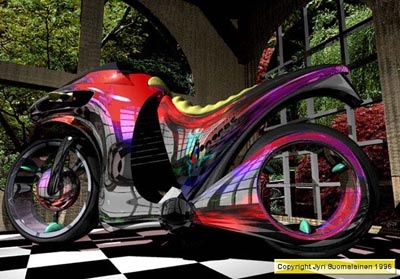"As technology shapes culture, so culture shapes technology."
This section is intended to show a little about how people
live in 2038, what clothes they wear, what they do and what
gadgets they use. These items are intended to spice up a
game and make it seem more alien. Society changes and so
should patterns of behaviour.
- Mimetic Camouflage has gone from military use to civilian
application over the last decade. Cars come coated with a layer
of electro-sensitive paint polymers which can be programmed with
any combination of colours, patterns, or even live newsfeeds.
The picture below is an example of a Shang Industries HP-X200 with polychromatic
and polymorphic surfaces.
Even softcore pornographic pictures can sometimes be seen on
teenagers' cars; police rarely bother with such minor infringements.

- Compads come in hundreds of designs and configurations, the
most popular one being the wristband design. The wristband is tuned
to your voiceprint and hears commands without having to be lifted
to the face. Ergonomic buttons make programming a snap, while a
small projector can also be attached to provide 'floating menus'
on your retina.
- Instant Communications are ubiqitous in the developed world and
even fairly common in undeveloped countries. So you can call your
grandmother in Siberia from Paris for a negligible yearly fee. Long
distance fees are long gone; the practise is illegal in the US.
[Design Note: no, this isn't a phreaker's wet dream, it's a current
trend that is gaining in strength. Your kids won't know what 'long-
distance charges' are. Honest.]
- Jobs are quite different in the future. Since manufacturing has
taken the same role as farming (now employing only 5% of the workforce),
most people are in the services and informatics sectors. Job descriptions
include: simulationist, traffic controller, modeller (creates 3d models),
coder (low class, the vast majority are trained only to write a few
basic modules), supervisor (supervises off-shore robotic factories),
data rationaliser (datarats; trained to optimize code and network flow),
datarchaeologist, net topologist (studies the terrain of networks),
geomaticist (analyses satellite imagery data), datahound (finds info),
environment controller (maintains virtual worlds),

Virtual worlds are an addiction to entertainment that has spoiled
the ruling elites in most countries in which the medium is unregulated
(Islamic countries regulate virrea strictly). Several US states, among
them Utah and Idaho, regulate veeworlds (as they have come to be
known) and forbid not extreme environments. Excessive sensory stimulation
has been proven to be psychologically addictive, and several lobby
groups (such as TrueLife) have been formed to limit the exposure of teens
to veeworlds. Digital Union is currently fighting a legal challenge at
the World Court that claims it uses subliminal sensory input to addict
its users to a sweeping new online religion. The picture below is an
example of the fantastic worlds designed by simulationists to distract
us from the drudgery of everyday life. Veeworlds are also used by the
ruling geriatocracy to channel the aggressive political energies of the
young into harmless entertainment.
- Lifters have replaced helicopters in many applications. These are
large craft which use redirected turbine-thrust to vertically lift off
without the need for rotorblades, much like the current Harrier jumpjet.
The technology has advanced to the point where you can build small drones
which operate in same fashion. Cargo lifters are used in the Pacific Conflict
Zone to drop off commandos in remote regions without airstrips and to
supply isolated communities. They are fuel inefficient and are not good
for long-range flight.
- Tens of Thousands of tiny eyesats patrol the skies and monitor all
actions on the ground in the developed countries. Eyesats weigh only
about 1 kg and have dimensions only large enough to accomodate the
camera eyepieces and radar imaging gear they carry. Connected to the
global infosphere, these satellites watch every square metre of space
in the United States and relay the data to Great Minds for analysis
and collation. Eyesats are used by police departments to monitor shady
neighbourhoods, tag suspects, follow criminals, track the movement of
individuals, and to keep an innocuous eye on possible foreign terrorism.
The Federal Bureau of Security is the biggest user of eyesats, but
the system is run by private enterprises and can be rented for use.

MICRODISC : the standard storage medium. They are 3cm or 1" in diameter and can store n mems each. Several competing 'standards' vie for the consumer's attention in Europe, America and Asia.



